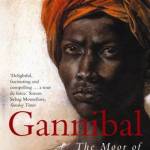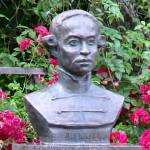Imagine that this is your life story:

You are born in Africa, possibly in Ethiopia or perhaps Chad, but as a child you are taken by Arab slavers and sold in Constantinople to the Sultan of Turkey, before long catching the eye of a Russian diplomat and spy, who acquires you and smuggles you out in order to send you to the Kremlin in Moscow as a gift to Peter the Great, who becomes your godfather and, impressed with your wit and obvious intelligence, has you given the best education, whereupon you grow up to be a first rate military engineer, being posted on campaigns from the Basque country to the Baltic (where you meet in Königsberg the then-mathematics tutor Immanuel Kant), along the way learning French (naturellement!) and studying mathematics, such that when you engage in further study in Paris, you charm not only the wives of noble women with your sexual charisma but meet and impress Voltaire, Diderot, Montesquieu, and Leibniz as one of the few people in the world who is proficient at Newtonian mechanics and the new calculus, leading you to be nicknamed “dark star of the Enlightenment,” although when you return to Russia you run afoul of a power struggle after Peter the Great’s death and are exiled to a place in Siberia 4,000 miles east of St. Petersburg and near the then-Chinese border, though some years later you are pardoned and return to further exploits of military engineering for which you are rewarded with large estates of your own, meaning, in 18th-century Russia that you become a slave owner yourself because of the serfs who come with the land, and all is well except that your first wife hates you because it was an arranged marriage against her will and she has cheated on you, leading to a divorce and your marriage to a woman of noble Scandinavian and German origin, with whom you have ten children, one of which would become General-in-Chief, the second highest rank in imperial Russia’s military, and one of which would become the grandfather of Alexander Pushkin, thought by many to be the greatest of Russian poets.
Except that your story is real, your name is Abram Petrovich Gannibal, and your biography is well told by Hugh Barnes’s Gannibal: The Moor of Petersburg.
According to Barnes, Peter the Great’s interest in the young Gannibal was both personal and social-reformer: “by educating the young Negro in a style befitting a prince, the tsar hoped to teach the nobility a lesson, ‘and to put Russians to shame by convincing them that out of every people and even from among wild men—such as Negroes, whom our civilized nations assign exclusively to the class of the slave—there can be formed men who, by dint of application, can obtain knowledge and learning, and thus become helpful to the monarch’” (p. 97).

Further, “[Peter] admired the African’s didactic spirit, and believed his formidable mathematical talents would unlock Russian potential: ‘Abram Gannibal furnished the most striking proof of the injustice of that odious prejudice which assigns to the Negro race a reputation of intellectual and moral inferiority. He had immense spirit, a prodigious facility for study, and a rare capacity for mathematics and diverse branches of the human sciences, although mathematics always served as the science-mére. He was also blessed with a noble and elevated character and an incorruptible probity’” (p. 129).
Barnes’s Gannibal is well worth reading for a colorful, quintessentially Enlightenment-era life.
[The image is of a memorial bust of Gannibal in the province of Pskov, Russia.]
whoa.
OK, that’s going right to the top of my reading list. It sounds quite similar to the historical fiction trilogy by Neal Stephenson, “The Baroque Cycle.” All the better that it’s factual.
(I wrote a brief review of the books here.)
I’ve read Cryptonomicon but not The Baroque Cycle. I’ll check into it.